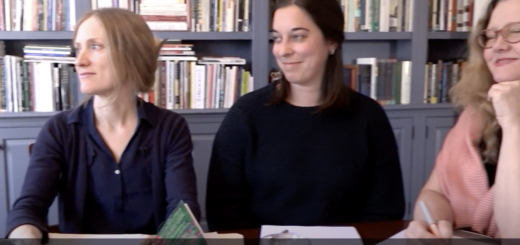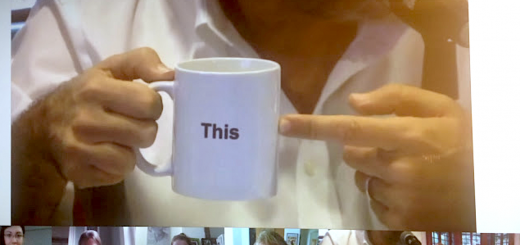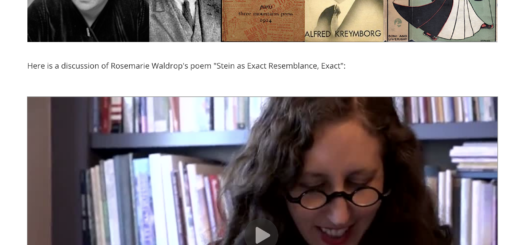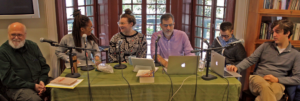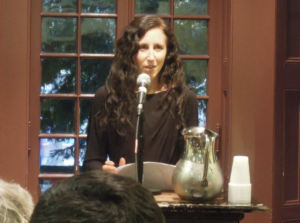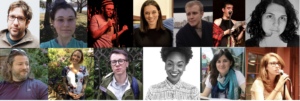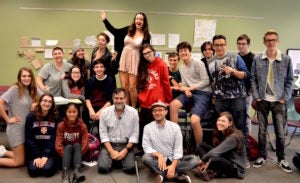ModPo update: week 10 begins!
We now begin the final week of ModPo 2019’s “symposium mode.”
Week 10 begins today. HERE are the poems and videos. The poets we discuss this week are testing the limits of our understanding of creativity. Can a poem be made that is not original? Can a poem be made that is composed on the basis of a concept, whereby the concept is meant to be just as poetic as the poem that results from the application of the concept? (Or, as some would argue, more poetic?) These poets, in widely divergent ways, show us how creative it can be when you write uncreative writing.
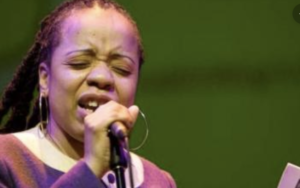 The final poet—in the main syllabus and also in ModPoPLUS—is Tracie Morris, a musical poet, a performance poet, a poet of speech acts, a poet who causes her voice to work around already produced/existing languages. And we are honored to welcome Tracie back to the Writers House on Wednesday. She will meet with a group of us in the House at noon, and then she will join our weekly worldwide ModPo webcast at 3 PM (Philly time). Please plan to join us!
The final poet—in the main syllabus and also in ModPoPLUS—is Tracie Morris, a musical poet, a performance poet, a poet of speech acts, a poet who causes her voice to work around already produced/existing languages. And we are honored to welcome Tracie back to the Writers House on Wednesday. She will meet with a group of us in the House at noon, and then she will join our weekly worldwide ModPo webcast at 3 PM (Philly time). Please plan to join us!
Once ModPo 2019 is done next weekend, we will convene for our annual “Final Words” webcast on Monday, November 18th, at 10:30 AM.
I have created a FINAL WORDS thread HERE. Any time before November 18th, please post your final thoughts about ModPo in that thread. We will read them all, and we will quote from a selection of these comments during the Final Words webcast.
During week 10 we will also read and post comments in response to those who submitted poems and essays for assignment #4. Please do HERE and read a few of these and offer your comments! We hope that every essay submitted will receive at least four responses. To see the assignment, go HERE.
Below I have copied the headnote to week 10. In my daily updates this week, I will offer a sampling of week 10 poems from our vast selection of additional materials in ModPoPLUS.
**
WEEK 10 HEADNOTE
Not every artist we meet here claims to be part of a trend or movement now widely known as conceptualist poetics or uncreative writing. Some have at times embraced one or both of those terms: Kenneth Goldsmith, Christian Bok, Caroline Bergvall. Others, such as Rosmarie Waldrop, have been involved in appropriative and unoriginal practices for decades. Erica Baum is a photographer of found language who seems to thrive in the atmosphere created by the explicit conceptualists. Michael Magee is an original Flarfist, which some see as divergent from conceptualism but here at least seems certainly a cousin. Others we encounter in our final week (Jennifer Scappettone and Tracie Morris) are using unoriginality and linguistic borrowing and “writing through” for their own reasons and are creating distinct effects. But every artist in chapter 9.3 displays an intense virtuosity that defies what most people at first expect from writings made out of such an adamant rejection of creativity. We hope that despite the strangeness of it all you will find pleasure in watching them undertake their hyper-concentrated, seemingly impossible projects. What can look easy in such experimentalism is often demanding in the extreme. It’s hard to imagine a better examples of this than ‘Africa(n)’ or ‘Eunoia.’

